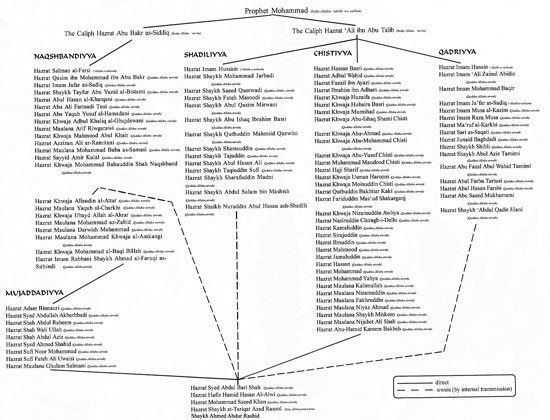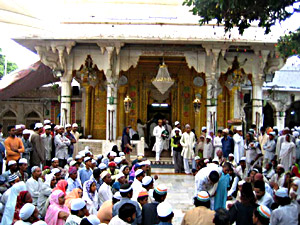Chishti Order
Chishtiyya is a moderate Islamic orthodox Sufi orders ( tariqa ), originally native to the Indian room, but now the world has found followers. Founder of this order is Abu Ishaq Shami († 940), the best-known representative is Moinuddin Chishti ( 1141-1230/1236 ).
History
The name of the order derives from Chisht, a small town about 140 kilometers east of Herat ( Afghanistan). The first, called himself Chishti was Abu Ishaq Shami, a Sufi from Syria, probably from the city of Damascus ( ash-Sham ). This met another Sufi, who told him to settle in Chisht, after which he was called Abu Ishaq Shami Chishti. In the year 940 he died in Damascus and was buried on the mountain Qasyun, on which also the burial place of the famous mystic Ibn Arabi was later built.
Moinuddin Chishti came in 1193 to Delhi and finally settled in Ajmer. This place was shortly afterwards an important center for the Islamization of India, particularly the central and southern parts of the country. The Chishtiyya spread relatively quickly in these areas, not least the most conversions to Islam in India were at that time largely thanks to the Chishtiyya Saints. Many Hindus at that time were impressed by the simple preaching and practice of the love of God and neighbor; especially Hindus from lowly box and box lots.
Muinuddins tomb is in Ajmer, at the time of Mughal rule a magnificent marble shrine there was built. Even today, it attracts thousands of devout Muslims on the anniversary of the saint even draw large crowds of pilgrims therefore of Pakistan to India.
Pakistani and North Indian Qawwali musicians usually lead back to the founder of the Chishtiyya Order in the 13th century, the Silsila ( lineage ) of the neat in their group musical style as a teacher -student series.
Construction
In the centers of the Order ( Khanqahs ) No differences were made between the students, there existed a kind of classless society. This attracted many Hindus, especially the poorer, under her spell. The students were of a center run by a Sheikh.
In addition, no money donations were from the Khanqahs accepted by the respective rulers of the country, because they refused to have anything to do with a secular government. They relied solely on donations from the people, the preservation of Khanqahs often proved difficult.
Teaching
Moinuddin Chishti had summarized the teaching of Chishtiyya in three principles. Thus, a Sufi generosity like that of the ocean, mild like that of the sun and modesty as the earth should possess.
In addition, the Order, in contrast to almost all other Sufi brotherhoods never contact to state governments or state officials. This is because the Chishti civil service incompatible with spiritual progress.










